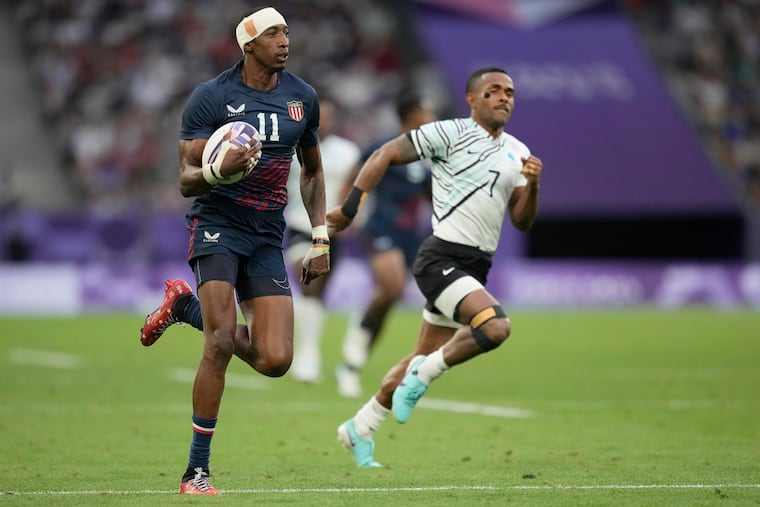The Eagles cut Perry Baker in 2011. He was the star of the Olympics for the U.S. rugby team Thursday.
The Eagles let him go before he even practiced for them. Thirteen years later, he set an Olympic record for tries in the U.S.'s romp over Uruguay, and has no regrets.

PARIS — Thirteen years later, Perry Baker said no, the fact that the Eagles cut him during the summer of 2011 without a minicamp, without a training-camp practice, and with barely a word doesn’t prey on his mind anymore. “Doesn’t really bother me,” he said. It was just difficult to believe him based on the edge in his voice.
It was late Thursday night here at the Stade de Paris. For a few precious hours earlier in the day, Baker had been the biggest thing at the Summer Olympics. A wing on the U.S. men’s sevens team, he’s as much of a star as an American rugby player can be — a three-time Olympian, a two-time World Rugby Sevens player of the year — and the U.S.’s 33-17 victory over Uruguay to reach the quarterfinals had been his chance to stand in a brighter spotlight for a short while. Baker, who turned 38 in June, had scored four tries, the most by any male player since rugby sevens debuted as an Olympic sport in 2016, the first serious record to fall at these Games.
“I didn’t think anything about it,” said Baker, who turned 38 in June and, at 6-foot-1 and 160 pounds, is still built like the lithe wide receiver he was at Division II Fairmont State University in West Virginia. “I was told about it. It never went through my mind at all. It never could happen with all those boys next to me. You look at every single one of those tries, everybody did their job to free me to put it away. On any of my tries, someone always did the hard part. I just do my job and finish for the boys. I couldn’t do anything without them.”
Now, though, Australia had just wiped out the U.S., 18-0, to advance to the semis and consign the Americans to the placement round, and maybe that disappointment cut Baker’s words as he remembered the moment that ended his professional football career before it started. He had caught 90 passes, including 19 touchdowns, at Fairmont State, and the Eagles wanted to sign him as an undrafted free agent. But when the team’s doctors examined him, they discovered a torn meniscus. He’d been playing with an unstable knee for months. He failed his physical and never suited up.
» READ MORE: Philly at the Paris Olympics: Local athletes at the games and when they’re scheduled to compete
“Just devastation,” he said. “Being told, ‘Hold off on that contract. We’ve got to send you home.’ …
“I come from a small D2 school. I mean, like I was telling them when I was there, you still brought me in. You watched me work out. You watched my game film with this injury that’s been in my knee this entire season. For them to still give up me, that’s one thing for anyone in life: Don’t give up on yourself.”
That hot minute with the Eagles wasn’t Baker’s last attempt to play pro ball; he got in two years in the Arena Football League with the Pittsburgh Power. Still, the rejection told him where he stood in the sport, and he’d accumulated enough experience in rugby to try shifting his full focus to it. At Spruce Creek High School in Port Orange, Fla., Perry had a football coach who had introduced him to rugby by taking him to a workout for a strong local club: the Daytona Beach Coconuts. He joined the Tiger Rugby Academy in Columbus and a year later, in 2014, signed with U.S. Rugby to be part of the national team.
Its name: The Men’s Eagles Sevens.
Baker has become the reverse-Jordan Mailata, a guy for whom football was a gateway to a better life and career in rugby, instead of the other way around. His devastation turned out to be his inspiration.
» READ MORE: U.S. women’s soccer team kicks off Olympics with 3-0 win over Zambia
“No matter what happens, man, you can’t give up,” he said. “You’ve got to keep going, and who knows? You never know your story, never know your journey. You’ve just got to keep pressing. You might end up a three-time Olympian. It’s been an honor just to represent my country, my family, my friends, just everyone really — just the sport of rugby, try to help the sport grow, try to bring recognition to it, build this program.
“The sport has given so much to me. Football could never do that for me. Looking at the hindsight of it, there’s no bigger stage than playing in the Olympics, traveling with the national bird on your chest: an eagle. I mean, it’s bigger than football. I’m an Eagle on a bigger stage.”